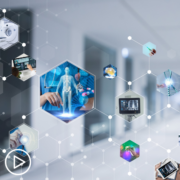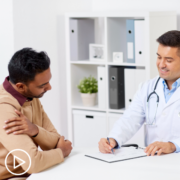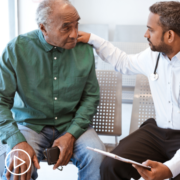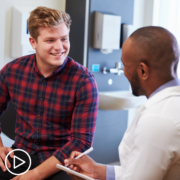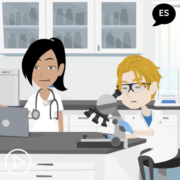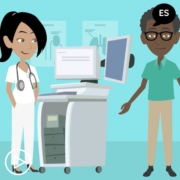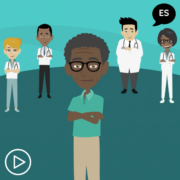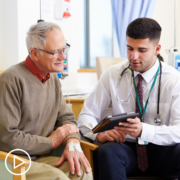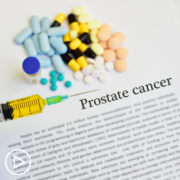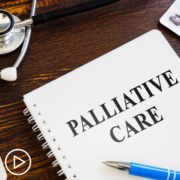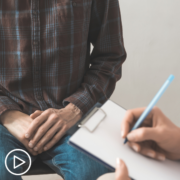Should you consider participating in a prostate cancer clinical trial? Dr. Sumit Subudhi explains the clinical trial process, addresses common trial patient concerns, and provides key advice for trial participation. Dr. Subudhi also shares an update on promising prostate cancer research.
Dr. Sumit Subudhi is an Associate Professor in the Department of Genitourinary Medical Oncology, Division of Cancer Medicine at The University of Texas MD Anderson Cancer Center.
See More from the Empowered! Podcast
Transcript:
Katherine Banwell:
Hello and welcome. I’m Katherine Banwell, your host for today’s program. Today we’re going to discuss prostate cancer research advances and the role of clinical trials and moving treatment developments forward. Before we meet our guest, let’s review a few important details.
The reminder email you received about this program contains a link to a program resource guide.
If you haven’t already, click that link to access information to follow along during the webinar. At the end of this program, you will receive a link to a program survey. This will allow you to provide feedback about your experience today, and it will help us plan future webinars.
Finally, before we get into the discussion, please remember that this program is not a substitute for seeking medical advice. Please refer to your healthcare team about what might be best for you.
Well, let’s meet our guest today. Joining me is Dr. Sumit Subudhi. Dr. Subudhi, thanks for being with us. Would you introduce yourself?
Dr. Subudhi:
Hi. I’m Sumit Subudhi. I’m an associate professor in the GU Medical Oncology department at MD Anderson Cancer Center. And I exclusively treat patients with advanced prostate cancer. And I’ve been doing it for about a decade.
Katherine:
Thank you. I’d like to begin with an update on prostate cancer research. Would you walk us through the newer classes of treatments that are showing promise?
Dr. Subudhi:
Yeah, in clinical trials, there are classes of drugs known as androgen receptor degraders. And so, the androgen receptor is a protein that basically is the mouth of the prostate cancer. That’s how I like to describe it. And it actually allows testosterone, which is the food, to be eaten by the mouth, and it actually helps the cancer grow.
And what these drugs do is they actually degrade or break down the mouth of the cancer. And, therefore, it starves the cancer to death, and that’s actually the concept. And they seem to be showing some exciting activity in clinical trials, especially in those patients who are resistant to the second-generation hormonal drug that you may have heard of already, such as enzalutamide (Xtandi), apalutamide (Erleada), and darolutamide (Nubeqa). So, I think is something that we’re looking forward to seeing more data on.
Another class of drugs are antibody drug conjugates or ADCs.
And these are what I think of as heat-seeking missiles. So, one part of the drug actually recognizes the cancer, and the other part of the drug actually has a payload that sort of releases a bomb or sort of like chemotherapy-type agent right where the cancer’s located and kills the cancer in that way. And we’re seeing some great clinical activity in prostate cancer with this class of drugs.
And then the final one is bispecifics, and in particular T-cell bispecifics. So, T cells are part of the immune system that actually help kill the cancer.
And, unfortunately, prostate cancer, like some other cancers like pancreatic and glioblastoma, have few T cells inside it. And, therefore, a lot of the immunotherapies that many people have heard about, such as ipilimumab (Yervoy) and pembrolizumab (Keytruda), they’re not very responsive in patients with prostate cancer. And it’s because there’s few T cells in prostate cancer.
What the T-cell bispecifics do is they actually have one part of the drug that actually recognizes the cancer and the other part that recognizes T cells. So, like a bulldozer, it brings T cells right into the prostate cancer and helps kill the cancer that way.
Katherine:
Now there are some inhibitors as well. Is that correct?
Dr. Subudhi:
Yeah. So, the immune checkpoint inhibitors have been around for a while. And, basically, in combination, they seem to be more effective in prostate cancer. But when given alone as monotherapy, they’re less effective.
Katherine:
Are these treatments specifically for patients with advanced prostate cancer?
Dr. Subudhi:
All of them are actually in trials in patients with advanced prostate cancer. And I define advanced prostate cancer as either having metastatic disease, meaning the cancer has spread to other parts of the body outside of the prostate.
Examples include lymph node, the bone, the lung, the liver. But there are so few trials in patients with locally advanced prostate cancer. What I mean by that is they have high-grade prostate cancer, but it’s local, or it’s just in regional lymph nodes. And some of these classes of drugs are being evaluated in that setting as well.
Katherine:
Let’s shift to talk about your research. What are you excited about right now?
Dr. Subudhi:
So, my research focuses on immune checkpoint therapies, which are the inhibitors that you were referring to and understanding how to make them work better in prostate cancer.
And we’re finding out that in prostate cancer there’s about 20 to 25 percent of patients that appear to respond to this type of treatment. But these are patients that don’t have a lot of bone metastases. And these immune checkpoint inhibitors are given in combination. So, they’re not given alone. They’re given with either a combination of anti-CD34 and anti-PD-1 or some other form of that.
Katherine:
Prostate cancer research really can only move forward through clinical trials and patient participation in those trials. Can you briefly explain what a trial is for people who may not be familiar with the term?
Dr. Subudhi:
That’s a great question. My own father has prostate cancer. And he had the same exact question when he started his journey in that.
And so, what I explained to him is that clinical trials are experiments. They’re experiments that are done in our patients.
So, they’re drugs that are thought to mechanistically kill the cancer cell or at least change the environment around the cancer cell to help people live longer. But these drugs were actually tested in mouse models or in tissue models. And we don’t know if they actually work in patients.
And so, in clinical trials, we’re actually testing whether these drugs are safe and whether they’re efficacious or beneficial to our patients. So, I want to be very clear. When patients go on clinical trials, we don’t know if it’s going to work on them. And that’s something that they should know that they’re showing a lot of courage and risk in joining these trials.
But the other point I want to make is that every standard of care drug that is out there actually went through the clinical trial process, and they were approved because they showed benefit in a group of patients.
Katherine:
Well, how can a prostate cancer patient benefit from participating in a trial?
Dr. Subudhi:
One of the key benefits is that you get access to drugs that may actually prolong your life or even cure you and that you wouldn’t have access to in trials.
And so, some of my patients, unfortunately, they’ve exhausted all the standard of care choices that are out there. And the trial’s the only option left versus leaving it up to natural causes of demise from prostate cancer. And so, clinical trials give other opportunities to potentially live longer and have a great quality of life.
Katherine:
So, they could offer some hope.
Dr. Subudhi:
Definitely. As far as I’m concerned, yes. And, actually, with my patients, I try to not wait while they’ve exhausted all the treatments to start them on clinical trials, because I feel like we may be able to save some of these treatments in our back pocket for when they’re too exhausted to be coming to our clinic so often. And so, I like to actually try to get them enrolled in clinical trials early on in their journey with prostate cancer.
Katherine:
I’d like to define some clinical trial terminology to help patients further understand the process. Let’s start with the phases. What occurs during each phase?
Dr. Subudhi:
So, great question. Phase I is the safety phase. So, all we’re trying to do is find the right dose of the drug that is actually safe to give in the patients. And we’re looking for the maximum tolerated dose. And once we find that dose, then we use that dose to go to Phase II of the trial. And Phase II trials are looking at efficacy. So, looking to see whether the trial is giving you any clinical benefit, meaning the cancer’s shrinking or even disappearing.
Katherine:
Go on.
Dr. Subudhi:
And then the third phase is Phase III where you’re testing the current drug, experimental drug, to either standard of care or to a placebo to see whether or not you get a benefit, either a progression-free survival benefit or overall survival benefit. And so, those are the three phases of clinical trials.
Katherine:
What are the different types of clinical trials?
Dr. Subudhi:
So, they’re controlled trials. Actually, I should back up. So, there’s open-label trials where everyone that enrolls in the trial will get the experimental drug. So, there is no control arms in these trials. Then there is the control trials where you can either get the drug, or you may get a placebo or standard of care drug.
There are some trials that allow for crossover, meaning that if you’re in the placebo or standard of care arm, if your cancer progresses, you can actually cross over and get the experimental drug. But I just want to be clear that not all clinical trials have crossover. And if you’re in a control trial, I think that’s an important question to ask your doctors about that.
But the reason why we do the control trials is that we’ve learned that using historical controls – for example, we’re doing a lot of combination studies with chemotherapy, such as docetaxel (Taxotere), which was FDA-approved in 2004. So, if we’re using historical data from almost 20 years ago, it’s not the same thing as our patients that are being treated with docetaxel now, because their treatment landscape has changed so much, and our patients have changed so much.
And so, for that reason, control trials give us a better sense of how effective this experimental drug is doing as opposed to comparing it to a historical perspective.
Katherine:
What other types of clinical trials are available?
Dr. Subudhi:
So, there are a few other options. So, we talked about open-label where everyone’s guaranteed to get the drug. We talked about a controlled study where you will either get one drug or another. And another type is a randomized trial where a computer decides whether or not you’re going to actually get one drug versus another. It’s not your doctor because a lot of people think that I’m making that decision, and I’m not. It’s actually a random computer.
And some trials have 1:1 ratio, meaning a 50 percent chance that you’ll get the experimental drug versus the control drug. But other trials have 1:2 ratio or 1:3 ratio. So, that’s something that, again, you have to ask your physician of how these trials are being randomized.
Katherine:
Well, in a randomized clinical trial, the patient isn’t going to know what drug they’re being given.
Dr. Subudhi:
Actually, that’s not true.
Katherine:
Oh, it’s not.
Dr. Subudhi:
So, you bring up a great question. So, there’s a double-blind randomized clinical trial where not only the patient doesn’t know, but even the physicians and the nurses. No one except for the pharmaceutical company that’s running the trial actually knows who’s actually getting which drug. And it’s only towards the end of the trial that we unblind, and then we share that information. Well, the pharmaceutical company first shares it with the medical team who then shares it with the patient.
Katherine:
I see. Are there other common clinical trial terms that you think patients should know about and understand?
Dr. Subudhi:
I think for now those are…
Katherine:
…they’re the most important?
Dr. Subudhi:
I think to me those are the most important. And I think that sometimes too much information can bog us down.
Katherine:
Well, speaking of information, there is a lot out there, some of which may not be very reliable. And that could lead many patients to having misconceptions about clinical trials. Let’s walk through a few common concerns we’ve heard from our community about trials.
One frequent question is – will I receive a placebo instead of a real treatment? And, first, I’d like you to define placebo. And should this be a concern for patients?
Dr. Subudhi:
Right. So, placebo is a drug that looks similar to the experimental drug. For example, if the experimental drug is a blue pill, then the placebo will be a blue pill. But it will be a pill that should have no known biological activity.
If the experimental drug is given intravenously and you get it in a liquid bag, then the placebo will also come in a liquid bag. So, it will look the same. And that’s why both the medical team as well as the patients or their families will not know which drug the patients have received, meaning the experimental drug or the placebo. But the placebos are meant to not have any biological activity.
Katherine:
So, it shouldn’t be a concern to patients then.
Dr. Subudhi:
Well, the concern that most of my patients share with me when they hear about placebo-controlled trials is, “Well, if I’m not going to get the experimental drug, why should I do this? I mean what benefit does it have for me?” And so, I tell them that one of the benefits is that we are watching you very carefully.
Because we don’t know sometimes which drug you’re getting. But in some control trials, like a randomized control trial, we will know because I’m not blinded.
If you’re in the arm that’s only getting chemotherapy, well, you know you’re not getting an oral pill. So, it’s very clear to the patient what they’re getting. But if they’re getting an oral pill that’s a placebo, we’re watching them very carefully.
So, we’re watching the patients very carefully in these placebo-controlled trials. And they’re coming in often so that we’re not going to miss any devastating things happening from the cancer. In fact, we’ll pick it up earlier than if they were just getting a standard of care outside of a trial. And for that reason I tell that my patients, “Don’t be worried.” And I always make sure that I have a backup plan.
So, the backup plan is either they’re going to cross over, meaning the trial allows for them to cross over to get the experimental drug. Or I have another trial that I know that they will qualify for. Or the third alternative is that I actually have a standard of care drug that I’m ready to give them the second I have it so that they don’t have to have those concerns.
Katherine:
That’s really great information to have. Patients also often have questions about safety. So, what are the risks of clinical trial participation?
Dr. Subudhi:
So, safety is a major issue, especially more into the Phase I. The Phase I trial, if you remember, are the trials where we’re dose escalating, meaning we start off with a small cohort of patients, maybe three to five patients. And we give one dose of the drug. We see if it’s safe. If it’s safe, then we go to the next dosing level. And we just keep going until we find a dose that may be too toxic or too unsafe for our patient.
So, in the Phase I, we have less information, especially in the first-in-human drugs. But in those cases, we are watching you carefully to make sure that nothing bad happens to you.
But the problem with those trials is it requires a lot of time at the institution or with your doctor. For example, I’m doing a bispecific trial where we have to keep the patients inside the hospital for eight days, purely for safety reasons. They’re not getting the drug for all eight days. But we’re just keeping them under observation so in case anything bad happens we’re ready to react because we know that if something bad happens at their home in that first eight days, it could actually risk their lives.
So, in those cases, some trials, if we’re concerned about safety, you’ll be spending more time in the doctor’s office or in a hospital being evaluated. So, that’s the one negative. But sometimes, the trials that can be more exhausting as far as the amount of time it takes you away from your home and family are the ones that have the most reward.
Katherine:
Well, what protocols are in place to protect patients?
Dr. Subudhi:
So, when they sign up for a protocol, we are instructed to give them our best information. So, let’s say it’s a first-in-human drug. Well, usually, first-in-human drugs are tested in other mammals, such as monkeys, and we look for toxicities there. And we have signs of what’s going to happen. Sometimes, a first-in-human drug is part of a class of drugs, like I talked to you about T-cell bispecifics.
Well, there’s several T-cell bispecifics out there. And we’ve learned that this class of drugs has a unique set of side effects that they all tend to have. Some have it more, and some have it less.
But when we’re discussing this with you or the patient, we are actually going to go through each and all of these side effects. Now, me personally, my patients that go on my trials, they all get my cellphone number so they have 24/7 access to me because I know they’re taking a risk. And it’s a lot of courage to go on these trials. And it’s scary. And I want to make sure they don’t feel like they’re ever alone.
Katherine:
Another common concern we hear is that a clinical trial is only considered when there are no other treatment options available for a patient. What are your thoughts on this?
Dr. Subudhi:
There’s a lot of my colleagues in the field that feel that way. And I know a lot of patients’ misconceptions are also that way. And that’s partly because of Hollywood and movies and TV shows that we watch. But I think that many people, especially in the medical field, think of clinical trials as the last resort.
And I actually disagree with that. I think that I like to actually start my patients with one or two standard of care treatments. But after that, really start putting clinical trials in between. And we have to remember that there’s not always a clinical trial available that the patient actually meets the criteria for.
So, it’s always disheartening in clinic when I meet someone for the very first time who was referred to me because they exhausted everything. And we just don’t have any clinical trials available, or they’re so weak from the cancer and all the prior treatments that they don’t qualify for a clinical trial. And then I really don’t have anything else to give them.
So, my personal approach is to try to put clinical trials in between and always have something in my back pocket so that if they get a bit exhausted or they want to spend more time with friends and family, they can get the standard of care treatment.
Katherine:
If a patient is interested in participating in a trial, what’s the best way to find out which trials might be available for them and right for them?
Dr. Subudhi:
So, that’s a great question. I think number one is always ask your oncologist, and they’re a great resource. But also, there’s websites. So, for different types of cancer – so, example, I do prostate cancer. So, the Prostate Cancer Foundation or PCF.org is a wonderful resource that will give you a list of cutting-edge trials.
In addition, the government has clinicaltrials.gov. And that’s where you can actually type in your cancer type and different criteria, and you’ll get a list of trials.
Katherine:
That’s good to know. What questions should patients ask their healthcare team when considering joining a trial?
Dr. Subudhi:
I would ask them, “Would you do it yourself if you were in my situation?”
Katherine:
Very good.
Dr. Subudhi:
I think that’s a very important thing to ask.
Katherine:
Are there barriers that interfere with patients’ access to clinical trials? I think you touched on this but maybe if you have anything to add.
Dr. Subudhi:
Yeah. So, travel can be a major barrier. And that’s something that the pharmaceutical industry understands. And, therefore, some of the trials, especially the multicenter trials, actually allow for travel cost. That sometimes includes flights, driving, hotels, food.
So, that’s something that’s important to ask because sometimes when we’re thinking about clinical trials, we’re so anxious in the doctor’s office. And then it’s not until we go back home when we’re trying to figure out how do we get the resources to come so frequently. You’ll find out that’s sometimes travel costs.
The other thing is underrepresented minorities are something that we’ve been doing a relatively poor job recruiting to our clinical trials. Part of that is just from history that we didn’t have the safety rules in place that we do now. And underrepresented minorities were affected negatively in some of the earlier trials.
And the other thing is just the resources of getting to and from their homes to our cancer site as often as they need to because they may be the sole breadwinner in their homes and things like that. So, there are resources to try to help do this. But I still think we have to do a better job.
Katherine:
Can trials be coordinated between a local doc and the institution?
Dr. Subudhi:
So, most trials cannot. Most. But there are some that can. So, if it’s a standard of care treatment, sometimes we can have the safety visits done with the local doctors. But every time they’re going to get the treatment they have to come see us at the institution that is actually running the trial.
But most of the time, what I tell all my patients is, “I want them to have a local doctor.” Because if there’s something that happens in the middle of the night, I want to be able to say, “You’re going to go to this emergency room where this doctor works.” And then when they go there, as soon as they get admitted into the emergency room center, I talk to the ER doctor, and I say, “This is what I want to be done. These are how these drugs work.”
Because they’re not going to know what these experimental drugs are. They’re not available in the community. So, I just think it’s important to have communication, especially for our patients that are out of state. MD Anderson is in Houston, Texas. And Texas is so big that a lot of my patients live six to eight hours away, and they’re still in Texas.
Katherine:
Oh, wow. So, what are your thoughts on what could be done to overcome the barriers that some patients are experiencing? And are there resources available?
Dr. Subudhi:
So, the pharmaceutical companies are putting in more financial resources as well as a diversity resource. And when I say diversity resources, those outreach programs just to make sure that the communities that are underserved are hearing about the clinical trials because if you don’t hear about it you’re never going to join it. So, one thing is just knowledge.
And then, number two, we’re trying to create financial resources. For example, there’s Angel Flight as one example where they will pay for the flight for you. And they’ll put you on maybe a chartered plane or something or a smaller plane to defray the cost of traveling by air. So, there are things out there, but we still need a lot more.
Katherine:
But one thing patients could do is talk to their healthcare team about what resources are available for them.
Dr. Subudhi:
Absolutely. Absolutely.
Katherine:
Before we end the program, Dr. Subudhi, I’d like to get your final thoughts. What message do you want to leave the audience with related to clinical trial participation?
Dr. Subudhi:
First of all, thank you for even thinking about it. That’s the one big step. And for those of you who actually take the next step and actually join a clinical trial, again, thank you for being so brave.
I think it’s a gift that you’re giving to other fellow patients with cancer. And it’s also a gift that you’re giving to the scientific and medical community, because we are learning by your participation in the trial. And I want you to know whether the trial worked for you or does not work for you, regardless, we’re going to learn something that’s going to help change outcomes in your cancer.
Katherine:
Dr. Subudhi, thank you so much for taking the time to join us today.
Dr. Subudhi:
Well, thank you. I really appreciate it.
Katherine:
And thank you to all of our partners. If you would like to watch this webinar again, there will be a replay available soon. You’ll receive an email when it’s ready.
And don’t forget to take the survey immediately following this webinar. It will help us as we plan programs in the future. To learn more about prostate cancer and to access tools to help you become a proactive patient, visit powerfulpatients.org. I’m Katherine Banwell. Thank you for being with us.

